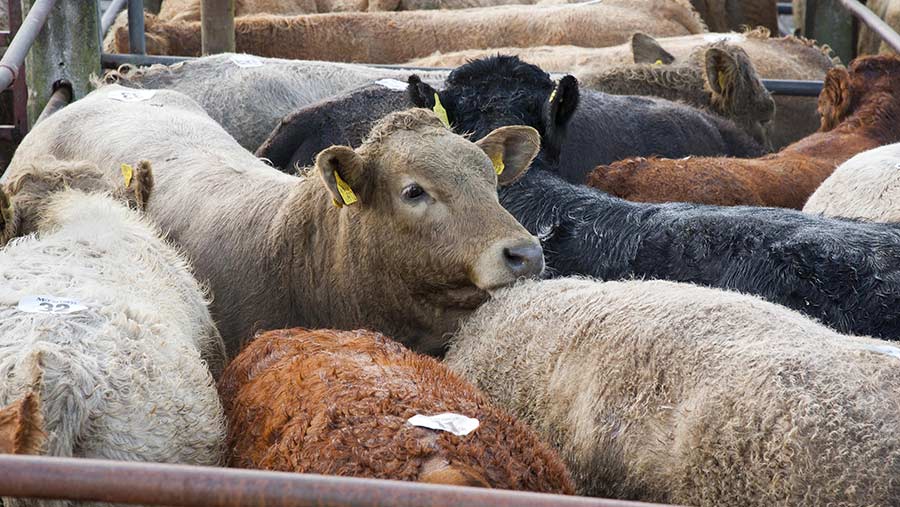Rising costs put ceiling on store cattle values
 © John Eveson
© John Eveson Dizzying costs have squeezed finisher margins and pegged store cattle values to the same point they were a year ago.
This is despite deadweight beef prices running 8% higher on the year.
Base prices remain largely above the 400p/kg mark across the UK. Northern Ireland has overtaken Scottish values to rival those seen in England.
Ulster farmers have seen more than 390p/kg for U-3 grade bulls, while in Scotland the R-grade base has slipped to 398-408p/kg.
See also: Rising powder and corn costs limit calf demand
Northern Ireland, which is drawing in store and finished cattle from the South to maintain supply, is helping support prices increases across the border, reports Bord Bia.
Labour problems related to Covid-19 and post-Christmas spending patterns remain the trade’s reasoning for cuts.
However, ringside bidding for short- and medium-term cattle suggests confidence that numbers will be tight for the months ahead.
Cockermouth
John Wharton of Mitchells Livestock said trade at the fortnightly store sale (28 January) was strong “across the board” at Cockermouth.
Mr Wharton said cattle traders and finishers were re-entering the market after a good year with more money to spend on securing feeding animals.
And while costs were mounting for cattle buyers, he thought it would affect the store price in six to eight months’ time only if there was no upturn in the prime beef price.
“A few buyers are starting to talk about costs hitting,” he said. “There are fertiliser costs and inflation on everything, but sheds need filling.”
He added that if there was no increase in the prime beef price, people might start to question whether they needed to do it.
Strong shapely suckler calves at eight to 10 months old had made £1,000, and most yearling types were £50 a head up on the fortnight. Better-quality short-keep cattle had made 230-240p/kg.
“Good 21-month bullocks are hitting £1,400. They will come up to £1,800 when they finish,” he said.
Ayr
Forward cattle prices eased in December but then bounced £50-£100 in January, said William Hamilton, cattle auctioneer for Craig Wilson Livestock at Ayr.
Price reductions from Scottish abattoirs had not yet deterred feeders. “A lot of buyers are convinced the job will stay reasonable,” said Mr Hamilton.
But with processor margins also tight, he wondered if it was time for costs to be passed on to consumers.
“I think the days of food being as cheap as it is could be numbered,” he said. “To maintain the store price long term, the fat price will have to come up.”
